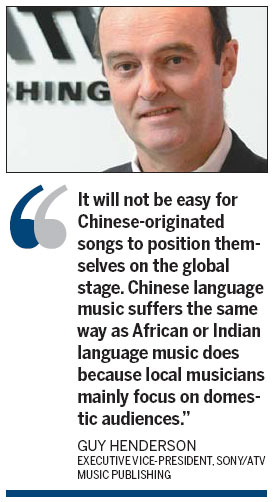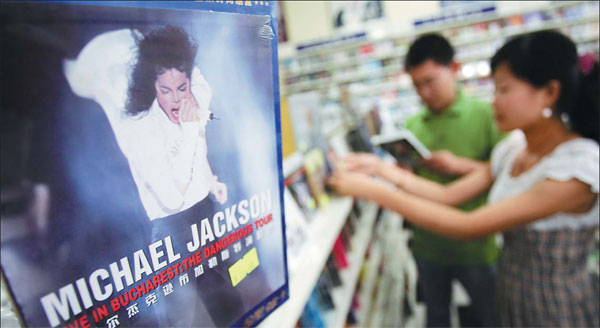Eyeing global appeal of local music
Updated: 2013-05-23 05:35
By Gao Yuan (China Daily)
|
||||||||
|
An audio-video shop in Weifang, Shandong province. China had a 400 million online music audience in 2012, according to the China Audio-Video Association. Provided to China Daily |
Sony/ATV to explore new frontiers in the industry, including China market
It was a privilege to work with international music legends such as The Beatles and Michael Jackson, but what kind of privilege will it be being able to continue to "work" with these great names in music history after they die?
Guy Henderson is one of a few people who consider themselves honored to have such a job.
As an executive vice-president of the world's largest music publishing company, Sony/ATV Music Publishing, his job is to make sure the most-valued relics in music continue to shine.
In the meantime, he also finds exploring new frontiers in the music industry exciting.
"The Beatles catalog is a jewel for Sony/ATV, despite most of the songs being written in the 1960s. It is exciting to see the titles are as popular - if not more popular - as they ever were," said the 52-year-old.
Henderson is responsible for the company's businesses in Europe, Asia, Australasia and South Africa, the most valued markets after the United States.
Yet what excites the music publishing veteran more than the 40-year license earnings of Yellow Submarine is the rapid growth of emerging markets, including China.
Expectations for the China market are "enormous" because of the size of the country, said Henderson. "We plan to give it our full shot."
Songs written in the local language tend to take 90 percent of the market share in their country. The same applies to China.

Born and raised in South Africa where African-style music plays a dominating role, Henderson said Chinese language songs were in the same situation. "It will not be easy for Chinese-originated songs to position themselves on the global stage. Chinese language music suffers the same way as African or Indian language music does because local musicians mainly focus on domestic audiences," he said.
China's music import and export ratio was 50 to one, meaning for every 50 songs the country imports, only one Chinese song is exported, Nanjing Morning Post reported last year, citing Wang Jianyuan, dean of the music college at the Nanjing University of the Arts.
The mainland market is dependent on songwriters from Taiwan and Hong Kong, but the market is ready for more writers from the mainland, according to Henderson. Sony/ATV plans to sign more talented local writers and help them explore the global market when the time is right.
The company has signed more than 300 songwriters on the mainland this year. Henderson claimed he is yet to catch sight of any Chinese writers who have enough international competitiveness and global influence.
But with the market maturing, it is only a matter of time to see Chinese artists working with international music and producing popular records in bigger markets over the next three to five years, he added.
"I think a good writer should remain loyal to his or her domestic market. If you try too hard to write for other countries or try too hard to develop music to be sold in other territories, that's where you end up stuck in no-man's land where the domestic market will not appreciate you and the international market doesn't understand you," Henderson said.
Henderson added the language barrier does not necessarily prevent local artists from attaining global success. "People would sit in opera houses around the world listening to Luciano Pavarotti with tears running down their cheeks and not understanding a word he sang."
Henderson began his career in the music business in 1993 as financial director for Sony Music's South African licensee, Gallo Record Co.
He started Sony Music South Africa in September 1995 in Johannesburg. Under his five-and-a-half-year reign, the company's market share surged to the nation's top and booked nearly all the licenses for international songs while developing a big local repertoire.
Henderson then got involved in setting up the Sony Music South Africa Publishing Co in 1998, his first experience in the publishing sector.
Working in publishing and record businesses was a totally different experience, Henderson recalled. Publishing work is more complicated because the executives have to handle a global network and you have to share copyrights with other interested groups. "However, in the record business you can 100 percent focus on your own artists," he said.
Sony/ATV's latest big move came last summer when a Sony/ATV-led group completed a $2.2 billion acquisition of EMI's publishing division. The merger cemented the company's lead in the global music publishing industry.
Henderson said despite some expected "ups and downs", the overall atmosphere of the new entity was "good".
He said the company will need more time to digest one of the biggest mergers in music history before looking for new firms to purchase.
Copyright issue
Henderson is no stranger to the entertainment industry because his parents were professional ballroom dancers giving global tours and he "had music around the house" when he was young.
Used to playing "some" drums, Henderson decided that his destiny was in the business of music instead.
His favorite band is Steely Dan, a US rock band that local pop culture magazine Rolling Stone described as "the perfect musical antiheroes for the 1970s". Yet he is careful not to let his personal interest interfere with his business.
"If you start to let your own flavor determine the business, you may let the right ones go. I have to stand back and be objective and say 'I don't really like this but I think it's going to sell'."
Seeing a favorite artist cooperate with others maybe bad, but Henderson and his team has to face a more intense fight globally: To protect Sony/ATV's music copyrights.
"China is not the only country with piracy problems but they are quite big and it is something that the nation needs to resolve," he said.
Some Internet companies, such as Baidu Inc, offer free music and literature to the public but the heavily debated copyright issues remain unresolved.
Gao Xiaosong, a musician and critic, believes China's music industry is working on a payment mechanism that may be released in July.
A number of industry insiders believe it may be a perfect opportunity for China's music industry to make breakthroughs in the intellectual property sector because the old record business system is dying and the digital music industry is still in its infancy.
A recent study from industry regulator the China Audio-Video Association showed the country had a 400 million online music audience in 2012, with all the copyrights possibly worth more than 40 billion yuan. But publishers could only collect around 800 million yuan from the market, a small percentage of the total.
Henderson said Sony/ATV will work with a local collecting society as well as online music platforms to create a better publishing environment in the country.
"I am a fan of attracting people into the market first rather than initially hitting them with a stick. When you enter a new market, the best approach is to become inclusive rather than exclusive," he added.
Looking forward, Henderson is optimistic about the upcoming digital era and confident about how the new way of enjoying music will benefit publishing companies.
"For years we have seen 'physical' music declining and digital increasing but not increasing fast enough to overcome the 'physical' decline. But now the digital era is unstoppable," he said, adding it took the industry a while to face the fact that the era of "physical" music has gone, especially for the "CD generation".
"I think everybody accepts that so long as you consume music you pay for it. It's just a different world and a different way of doing business," said Henderson.
Moreover, the digital world is set to give publishers more of a say in a record company-dominated ecosystem.
"The digital era has given the publishers autonomy to negotiate deals on their own. The flexibility of different services, such as online streaming, will increase the trend," he said.
gaoyuan@chinadaily.com.cn
(China Daily 05/23/2013 page14)

 Michelle lays roses at site along Berlin Wall
Michelle lays roses at site along Berlin Wall
 Historic space lecture in Tiangong-1 commences
Historic space lecture in Tiangong-1 commences
 'Sopranos' Star James Gandolfini dead at 51
'Sopranos' Star James Gandolfini dead at 51
 UN: Number of refugees hits 18-year high
UN: Number of refugees hits 18-year high
 Slide: Jet exercises from aircraft carrier
Slide: Jet exercises from aircraft carrier
 Talks establish fishery hotline
Talks establish fishery hotline
 Foreign buyers eye Chinese drones
Foreign buyers eye Chinese drones
 UN chief hails China's peacekeepers
UN chief hails China's peacekeepers
Most Viewed
Editor's Picks

|

|

|

|

|

|
Today's Top News
Shenzhou X astronaut gives lecture today
US told to reassess duties on Chinese paper
Chinese seek greater share of satellite market
Russia rejects Obama's nuke cut proposal
US immigration bill sees Senate breakthrough
Brazilian cities revoke fare hikes
Moody's warns on China's local govt debt
Air quality in major cities drops in May
US Weekly

|

|








